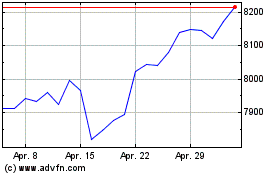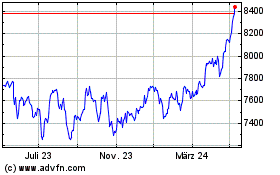By Carla Mozee and Victor Reklaitis, MarketWatch
U.K. inflation rate hits highest since September 2013
U.K. stocks closed lower Tuesday, pulled down as the pound
climbed after data showed British inflation rose by the fastest
pace in more than three years.
The FTSE 100 shed 0.7% to end at 7,378.34, retreating from a
record closing high hit in the previous session. The British
benchmark also was weighed by a broad selloff, as key European
(http://www.marketwatch.com/story/french-stocks-rise-standing-out-in-subdued-moves-across-european-equities-2017-03-21)
and U.S. equity gauges
(http://www.marketwatch.com/story/us-stock-futures-edge-up-as-nasdaq-tries-for-another-record-2017-03-21)
all posted solid declines as the trading day wrapped up in
London.
Inflation rose to 2.3% in February, above the Bank of England's
2% target for the first time since September 2013. That stoked
speculation that the central bank may be compelled to raise
interest rates sooner than later, sending the pound surging to an
intraday high of $1.2491 but shoving the FTSE 100 lower. Sterling
was recently
(http://www.marketwatch.com/story/euro-jumps-vs-dollar-hitting-6-week-high-of-108-after-french-presidential-debate-2017-03-21)
at $1.2486, up from $1.2357 late Monday in New York.
See:BOE rate hike in May? Pressure mounts after U.K. inflation
jumps to 3-year high
(http://www.marketwatch.com/story/boe-rate-hike-in-may-pressure-mounts-after-uk-inflation-jumps-to-3-year-high-2017-03-21)
Blue-chip stocks tend to rise when the pound falls, as the
currency's decline can lead to stronger earnings and sales from
overseas for multinational companies. The pound has dropped roughly
17% against the dollar since the U.K. voted last June to leave the
European Union, or Brexit.
Tuesday's data "has shifted the needle because we now know that
inflation is probably going to top 3% by the end of the year. But
we can't just keep hiding behind Brexit. We have to normalize the
economy, we have to have reasonable interest rates and prepare
people...that borrowing cheap money is over," said Steve Ruffley,
chief market strategist at InterTrader, in a telephone
interview.
A rate increase by the central bank from a record low 0.25%
would be beneficial for profit margins at banks. But shares of
banks pared gains or turned lower in afternoon trade. Barclays PLC
(BCS) (BCS) finished up by 0.7%, while Royal Bank of Scotland PLC
shares (RBS.LN) (RBS.LN) lost 0.7% and Lloyds Banking Group PLC
(LLOY.LN) (LLOY.LN) declined 0.8%.
Asia-focused lenders Standard Chartered PLC (STAN.LN) closed
down 0.1%, and HSBC Holdings PLC (HSBA.LN) (HSBA.LN) (HSBA.LN)
ended down 0.6%.
The yield on the 10-year gilt , as the benchmark U.K. government
bond is known, also pared its rise, moving up 2 basis points to
1.24%, according to Tradeweb. Higher yields are a benefit for life
insurers. Shares of Standard Life PLC (SL.LN) finished 0.1% lower
after an earlier gain evaporated.
Utility stocks were higher after the inflation report, with
National Grid PLC (NG.LN) closing up 1%.
See:EU sets April date for special Brexit summit
(http://www.marketwatch.com/story/eu-sets-april-date-for-special-brexit-summit-2017-03-21)
Elevated FTSE: Ruffley said the Bank of England may begin
raising rates in the first or second quarter of 2018, when policy
makers will have more information about Brexit but before the
country leaves the EU.
The FTSE 100 on Monday rose 0.1% to a record close of 7,429.81
(http://www.marketwatch.com/story/ftse-100-slips-as-the-pound-hits-3-week-high-2017-03-20),
aided by the pound's drop after the U.K. government said it would
trigger Article 50 on March 29
(http://www.marketwatch.com/story/uk-prime-minister-to-trigger-start-of-brexit-process-on-march-29-2017-03-20)
to begin the Brexit process.
"For the stock market to keep going higher on uncertainty is a
very unusual phenomenon," Ruffley said. "A correction in the FTSE,
like all indices, is inevitable. However, more short-term traders
like myself have learned very painful lessons by trying to short
the market," he said.
"Although the FTSE can continue to make new highs and correlate
with the American markets and a drop in the pound, it is
fundamentally due a retracement, and when it happens it's going to
be fast, it's going to be hard," he said.
The index is up 3.3% this year. It leapt 14% in 2016.
(https://twitter.com/samueltombs/status/844127352825233409)
Inflation: Rising fuel and food prices contributed to the 2.3%
reading, which was above expectations of 2.1% in a FactSet survey
of analysts. Last week, the central bank voted 8-1 to leave the key
rate steady
(http://www.marketwatch.com/story/boe-holds-rates-but-takes-hawkish-tone-2017-03-16),
but board member Kristen Forbes wanted a rate increase to stay
ahead of inflationary pressures.
"With inflation set to rise further over the course of this
year, today's data is rather 'big' upside news," said Kallum
Pickering, senior U.K. economist at Berenberg, in a note
Tuesday.
"As our base case, we look for a 25 basis points first rate hike
in Q2 2018, with a 30% chance the BOE raises the bank rate earlier.
After today's data release, risks to that call are skewed towards
the BOE hiking sooner rather than later," Pickering said.
Read:BOE chief Carney warns against giving into 'fatigue' for
post-crisis reforms
(http://www.marketwatch.com/story/bank-of-england-chief-warns-against-giving-into-fatigue-for-post-crisis-reforms-2017-03-17)
(http://www.marketwatch.com/story/is-the-uk-headed-for-a-snap-election-this-year-bookies-are-more-certain-than-ever-2017-03-20)Read:Is
the U.K. headed for a 'snap' election this year? Bookies are more
certain than ever
(http://www.marketwatch.com/story/is-the-uk-headed-for-a-snap-election-this-year-bookies-are-more-certain-than-ever-2017-03-20)
And see:The trouble brewing in Scotland for the U.K.'s Theresa
May
(http://www.marketwatch.com/story/distracted-by-the-continent-may-ignores-trouble-brewing-in-scotland-2017-03-21)
(END) Dow Jones Newswires
March 21, 2017 13:09 ET (17:09 GMT)
Copyright (c) 2017 Dow Jones & Company, Inc.
FTSE 100
Index Chart
Von Mär 2024 bis Apr 2024

FTSE 100
Index Chart
Von Apr 2023 bis Apr 2024
